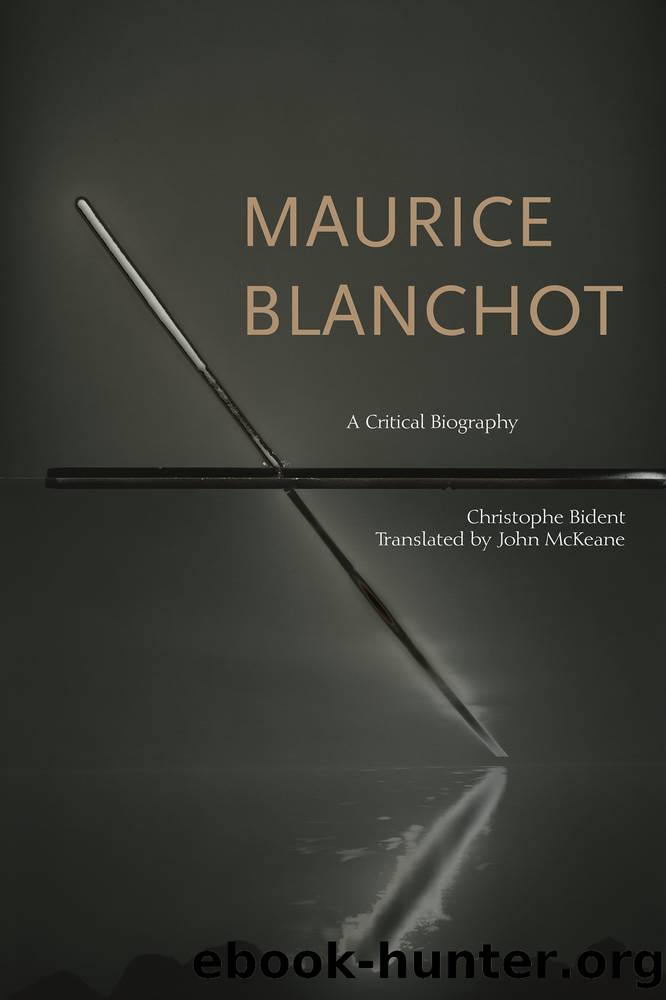Maurice Blanchot by Bident Christophe;McKeane John;

Author:Bident, Christophe;McKeane, John; [Bident, Christophe;McKeane, John;]
Language: eng
Format: epub
ISBN: 9780823281763
Publisher: Fordham UP
Published: 2019-09-15T00:00:00+00:00
CHAPTER 51
Characters in Thought
How Is Friendship Possible? (1958â1971)
After the friendships of the 1930s and the exceptional encounters with Emmanuel Levinas and Georges Bataille, Blanchotâs life progressed into a new mode of relation and thought as his work became structured by the temporality of the oeuvre and by political urgency. It was punctuatedâin the absence of the collective writing proposed by the Reviewâby a book published in 1971, Friendship.
Maurice Blanchotâs correspondence reveals that friendship, for him, always appears against a backdrop of loss; it is promised in advance to death and also beyond it, a way of responding to death or of preparing oneself for moments of weakness or exhaustion, of picturing death as a shameful, terrible, untamed accomplice in order to maintain the singular demand to remain attentive to all those whom it surrounds and strikes. On multiple occasions this correspondence demonstrates feelings of joy and of privilege, with small cards sent intermittently, as if as a form of embrace, or in epilogues to letters that suddenly change their tone, like melancholy smiles in which fatigue produces dependable, pitiless compassion.1 Blanchot was a letter writer who became more prolific even as he met his correspondents more frequently, but who in this period was forced to deal with destinyâs relentless campaign against those close to him: Georges Bataille died in 1962, Elio Vittorini in 1966, Paul Celan in 1970, the daughter of Louis-René des Forêts in 1965 (she âreturns in the night to shatter his heartâ), the child niece and adolescent nephew of Dionys Mascolo.2 Some friends went through endless mourning; others became ill. At a greater remove there were the deaths of those he had had dealings withâCamus in 1960, Breton in 1966, Paulhan in 1969. Such recurrence of death gives some justification to the choices and the structure of a book such as Friendship, which is at once a homage and a tomb, mixing in equal number the dead and the living in a collective memorial for Georges Bataille, with whom the book opens, and who allows it to open out at its end. This book draws on Bataille even for its title, which was originally considered for what became Guilty, as if friendship once again were nourished by a friendly borrowing of authority.3 The bookâs title, its two epigraphs, and the way its closing textâfirst published in a journal shortly following Batailleâs deathâfunctions as an epitaph all discreetly demonstrate how present the friend in question was. âFriendship: here I remember that Georges wrote this word and that he gave it to us.â4
Friendship is always, always-afterwards or always-already, given by a friend moving away, in the process of moving away, who before oneâs defeated eyes is in the process of moving their speech, body, and thought away. It is also the gift of a body, one that is dying or being carried off, still strangely and irreducibly similar. Blanchot wrote as much to Bataille, nearly a year before the latterâs death:
It has long seemed to me that the nervous
Download
This site does not store any files on its server. We only index and link to content provided by other sites. Please contact the content providers to delete copyright contents if any and email us, we'll remove relevant links or contents immediately.
The Power of Myth by Joseph Campbell & Bill Moyers(1046)
Half Moon Bay by Jonathan Kellerman & Jesse Kellerman(977)
Inseparable by Emma Donoghue(971)
A Social History of the Media by Peter Burke & Peter Burke(966)
The Nets of Modernism: Henry James, Virginia Woolf, James Joyce, and Sigmund Freud by Maud Ellmann(888)
The Spike by Mark Humphries;(804)
The Complete Correspondence 1928-1940 by Theodor W. Adorno & Walter Benjamin(772)
A Theory of Narrative Drawing by Simon Grennan(771)
Culture by Terry Eagleton(768)
Ideology by Eagleton Terry;(729)
World Philology by(710)
Farnsworth's Classical English Rhetoric by Ward Farnsworth(705)
Bodies from the Library 3 by Tony Medawar(700)
Game of Thrones and Philosophy by William Irwin(699)
High Albania by M. Edith Durham(695)
Adam Smith by Jonathan Conlin(684)
A Reader’s Companion to J. D. Salinger’s The Catcher in the Rye by Peter Beidler(674)
Comic Genius: Portraits of Funny People by(642)
Monkey King by Wu Cheng'en(640)
